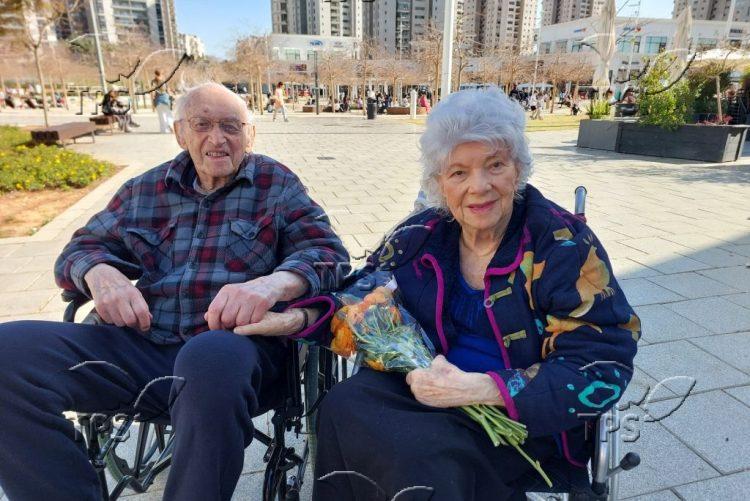Never Too Late: 101-Year-Old Immigrant Celebrates Israeli Citizenship
Jerusalem, 12 March, 2023 (TPS-IL) -- Not many people get the opportunity to write a dramatic new chapter of their lives after reaching 100. But 101-year-old Sandy Goldstein and his wife, Rosalie have managed to experience a wide-range of Israel barely one week after arriving. The emotional scenes of a massive family reunion at the airport. An outpouring of support from new neighbors.
And an incident spotlighting special needs of elderly immigrants.
Asked how he feels to be an Israeli citizen, Sandy told the Tazpit Press Service, “It is the fulfillment of a life long dream for me and my wife—I am proud and feel that I am where my heart has always been. Now I am a full Jew in his home.”
Accompanied by their daughter, Risa Shapiro, the Goldsteins were greeted in the Ben-Gurion Airport arrival hall by five grandchildren and 12 great-grandchildren living in Israel. A blue sign eagerly held up by several children said “Welcome Grandma and Grandpa!” It was a long way from Englewood, New Jersey and the life of a controller and CPA for a construction company in New York City.
The Goldsteins have been married for 75 years, but their aliyah, or immigration, might have happened decades ago if not for an encounter with a Jewish Agency worker who discouraged Goldstein from immigrating when he was 42.
“I couldn’t believe it,” Goldstein recalled to TPS. “He gave me all the bad points, everything under the sun. I said I’ll put up with it. He said you’re too old. I’m here 60 years later to prove he was wrong. Maybe they wanted young people who could go into the army.”
Asked why they didn’t move to Israel anyway, Goldstein said, “I had a good job and my kids were growing up. Life goes fast, and before you know it, you’re 101.”
Rosalie, now 97, added, “Life gets in the way. Aliyah came in its time.”
The Goldsteins are now living with their daughter, Risa Shapiro in Netanya.
During their very first week in Netanya, the Goldsteins had their first encounter with Israeli health care. Sandy wasn’t feeling well so Shapiro took her father to Netanya’s Meir Hospital. Doctors quickly realized that Sandy, who slept for most of the nonstop flight from Newark, had dehydrated.
“A professor conferred with the doctors on my case,” Sandy told TPS. “He told me, ‘You were a very sick person, being dehydrated. But Someone upstairs really wants you to be here.’ Outwardly, he didn’t look religious, but it was touching that he expressed himself that way. That never happened to me in America.”
Elderly Immigrants
Shapiro is uniquely qualified to talk about the needs of elderly immigrants. Her background is in geriatric social work, but she currently works as an aliyah consultant and coordinator for Olim Advisors, which helps immigrants with their pre-and post-arrival plans.
“We work with olim [immigrants] from all over the world. We pick up where Nefesh B’Nefesh leaves off,” Shapiro told TPS. Nefesh B’Nefesh is a non-profit organization that promotes and facilitates North American Jewish aliyah.
Citing a recent report released by the Jewish Agency and the Ministry of Immigration and Absorption, 70,000 new immigrants from 95 countries moved to Israel in 2022. Of that number, Shapiro noted, 13 percent were 65 or older.
While many people over the age of 65 talk about moving to Israel, the financial considerations and fear of the unknown — particularly the complexities of Israeli health care — are a deterrent.
“I think the older someone gets the harder it is to move,” Shapiro said.
Support may be in the form of living with relatives, staying in an assisted living facility, or having live-in care.
“I worked in assisted living and some of the residents had family here, others didn’t, and we were their ‘family’ or support,” Shapiro told TPS. “My feeling is that an older person as time goes on needs more support. Money helps because you can hire household help, a caregiver. Any oleh [immigrant] needs that monetary support. It’s more expensive to get old in America because everything there costs more. You also need the monetary ability to make the move.”
“If they do not have money and no family or support here I think it would be very difficult,” she stressed.
“There’s always a reason not to make aliyah. My children are here, my doctors are here. When you have the unknown, you wonder ‘What if?’ Younger people can move back, but for my parents aliyah is a one-way ticket,” she explained.
“There are so many factors going into making aliyah, where to make aliyah, and how to make a soft landing,” Shapiro said. “The bottom line is the personal drive, to really want it, handling the unknown or fear factor, and making a real plan for support, whether family or financial. And choosing the right setting for success.”
Then there are people who purchase homes in Israel and live there for part of the year.
“Anyone who took the leap and bought an apartment here, they’re either making aliyah, or on the way to making aliyah. Its a halfway step. Other people have told me that they bought an apartment in Israel because of their fear of antisemitism in America and other places.”
Asked if he has a message for other elderly people considering making the move, Goldstein said, “Do not wait. Life only gets more complicated. Reap the joys and benefits that life in Israel can give you as soon as you can. You have no idea what you are missing.”







